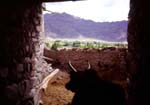


|
|
 |
| HOME | TRAVEL | TRAVELOG | ||

A Tale from Ladakh ... growing up in Little Tibet Jaideep and Suniti Mukerji
The festivities lasted well into the early hours of the morning for three days and endless glasses of the local chhang beer kept everybody's spirits high. Relatives, friends and anyone who remotely knew the family travelled from far corners of Ladakh to join in the festivities and their feelings of easy familiarity and close kinship served as a strong contrast to our lonely lives in crowded cities.
Over the next two visits to Ladakh, I found Phuntsok happily settled into family life. His father had given him a plot of inherited land not far from Leh at his wedding and Phuntsok decided to build a small one roomed house for himself in a corner of that piece of property. Friends and neighbours all came to help with the construction and the house was ready in less than a fortnight. Rigzin, his wife, planted potatoes and garden vegetables on the rest and grew enough to feed the family and even to sell the surplus to supplement Phuntsok's seasonal income as a trek guide. Dolkar, their daughter was born and Rigzin brought an orphaned teenaged cousin from her home village to live with them to help her bring up the baby. With a young and growing family, I found Phuntsok increasingly unhappy with the little money he made as a trek guide working for Angdu. It was only the attraction of the generous tips, that his satisfied clients occasionally gave him at the end of their Ladakhi holiday, that kept Phuntsok working for his old boss.
That was eight years ago -- Phuntsok's trekking company has grown to be one of the bigger ones in Leh. The modest one roomed cottage is now a big house of two storeys and Phuntsok drives a scooter around Leh. He even talks of buying a small car to drive on the dusty Leh streets now that his son, Gyal is growing up. I see a half dozen new trekking agencies every summer, when I visit Leh. And by the following year they have faded away only to be replaced by six more. Leh has grown in size and now has a sizeable number of Tibetan families who fled over the high passes from Tibet to escape Chinese persecution in their homeland. I have seen Dolkar, Phuntsok's daughter, grow up to be a teenager wearing blue jeans and dark sun glasses listening to the Spice Girls on her walkman. Television has brought glamourised colour images of a 'cool' western lifestyle. It saddens me to hear the young Ladakhis talk about their 'impoverished and backward' homeland.
I have seen Phuntsok raise our spirits and bring a smile to our faces when, after a nine hour walk, we have been hopelessly lost in the dark with no sign of a campsite. I have seen him loudly and tunelessly sing ribald songs to make us forget bone-aching fatigue while struggling up steep slopes at 19,000 ft on the Stok Kangri peak in a snow storm. And I have seen our Ladakhi cook roll his sleeves up and ingenuously produce a hot meal for fifteen people after our supplies have been tossed down the hill by a moody horse. I know Ladakh will survive. Jaideep Mukerji, based in Vancouver, has considerable trekking experience. He has been walking and climbing through some of the remotest Himalayan valleys for the last nine years. He has also contributed to the India Handbook by Robert Bradnock, from Footprint Handbooks. His wife, Suniti helps him with his research and writing.
|
|
|
Back
|
|
|
|
|
|
HOME |
NEWS |
BUSINESS |
CRICKET |
MOVIES |
CHAT
INFOTECH | TRAVEL | LIFE/STYLE | FREEDOM | FEEDBACK |
|